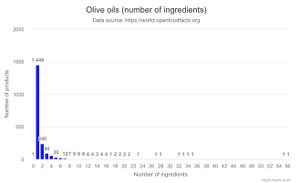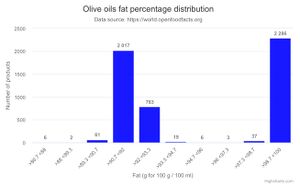Difference between revisions of "Olive oil - en"
(→Energy) |
|||
| Line 50: | Line 50: | ||
=== Energy === | === Energy === | ||
| + | == Olive oil conclusions and thoughts == | ||
== Conclusions and thoughts == | == Conclusions and thoughts == | ||
Revision as of 08:42, 15 December 2020
Introduction
In november 2020 @stephane asked to have a look at the products in the olive oil category. The category was in need of cleaning up. An olive oil should have a Nutriscore D or C, but other values were seen. So I had a look at the products and cleaned a bit. This post is a log of my observations.
Background
Olive oils are a special category for Nutriscore, as they are a special case for the score calculation. Olive oil is seen as one of the better oils, and thus may get a better score. This exception was recently introduced (a refrence here?).
However all oils are bad, so olive oil will never get a better score than C. This has provoked a lot of resistance in Italy and Spain, as olive oil is seen as a major export product. Those countries might leave out olive oil from the Nutriscore obligation.
Definition
https://en.wikipedia.org/wiki/Olive_oil is a simple product: it has only one ingredient: olives. The extraction process and origin might influence the actual composition of oils. This might be visible in the nutritional values and labelling on a product.
Completeness
On 13 dec 2020 the https://world.openfoodfacts.org/category/olive-oils is comprised of 6118 products. There might be olive oil products, which are not labelled as such.
Robotoff comes here to the rescue, as it might have found some eligible products. On 13 dec 2020 there were no remaining questions on Robotoff.
Missing data
There are many products for which we have no nutritional data. Clearly there is a role for Robotoff to play here. It is impossible to do it by hand.
Interlopers
Are all the products in the Olive oils category indeed olive oils. We need to find the products that are not olive oils (the interlopers).
Number of ingredients
A first check is to look at the number of ingredients. And it turns out that are some products that seem wrongly classified.
Note that of the 6118 products only 1967 seem to have ingredients defined.
Not sure how I can list the products with more than 1 ingredient.
Another way to fin interlopers is by looking for strange nutritional values, but that can also be due to wrongly entered data.
Data quality
Fat percentage
A next step to correct wrong nutritional data, starting by looking at the fat percentage. There are 6 products with more than 100% fat, so lets correct those first. It easier to list those with a query and correct them. For these products the wrong data has been added. One product had a fat content of 101g though.
The next edit round looks at fat percentages lower than 88%.
I repaired the following errors:
- wrong classifications
- mixup between per serving and per 100g data
- all nutritional values set to 0
- forgotten to check per serving
- no total fat percentage on label
The final result of the fat percentage distribution. Note that the distribution has two peaks, one around 100% and one around 90%. It seems that some producers assume that their olive oils consist of 100% fat and others really have it measured.
Energy
Olive oil conclusions and thoughts
Conclusions and thoughts
New categories
By looking more closely at all the products we can identify other categories. Only if there are a lot of products in each category or if the nutritional values deviate to much, it is worthwhile to create these new products
- pure olive oils: the current olive oils category should be renamed to pure olive oils to indicate that these products contain only one ingredient. This helps also to distinguish from the other olive oils.
- olive oil sprays for olive oil contain other ingredients to make it sprayable. As the serving is only 0.25g, the nutritional values per serving are all zero (thanks to rounding).
- enhanced olive oils: these olive oils have added vitamins for children(?)
- flavoured olive oils: these olive oils have added flavours (garlic, etc.)
Canonical fat percentages
Many products use, what seems as, standard canonical values for nutritional values. Looking at the other products these seem not to reflect the real product.
Quality indicators
Many olive oils sold in the USA show extra quality indicators (eg this one). We could add these parameters to the nutritional values.
US import issues?
Many US product are not indicated by serving. In the total fat field, the monounsaturated fats are shown. Did we have an import issue?
What is missing?
If the total fat content of olive oils is around de 92%. What is the remaining fraction of 8%. It is not indicated as nutritional value. Can it be water?
Quality check
Can the verified average values be used as a quality check on new products?
Vitamins
Quiten often the Vitamin E and Vitamin A are indicated. Quite strange. As if you are going to take olive oil for your vitamins. I guess the producers want to improve the health standing of their products.
Missing Nova
Many products have no Nova calculated as their ingredient list is empty. Could we default to olive oil?
Monosaturates versus polysaturates
Wrong product information
Several products present nutritional information that is clearly wrong. How can handle that?

